The 2024 Oscars Celebrate Films Rooted in History, But With an Eye Toward the Present

Emma Stone in 'Poor Things,' a gothic period piece that goes from twisted comedy to wildly anachronistic fairy tale. Photo: Yorgos Lanthimos/Courtesy of Searchlight Pictures © 2023 Searchlight Pictures All Rights Reserved
Tweed suits, porkpie hats and gingham dresses – those aren’t the outfits we expect to see on the Oscars red carpet, even though they’re featured heavily in nominated movies like Barbie and Oppenheimer. Seems that the contenders for Best Picture this Sunday raided storage units at Chanel and Mattel, digging up vintage threads to tell stories that often were looking back in time, just the way the Academy likes it.
The Holdovers is a warm holiday comedy about a teacher and student bonding, snugly set at a boarding school in the 70s. Maestro and Rustin are portraits of two queer icons, Leonard Bernstein and Bayard Rustin, who were active during the Civil Rights era, though only the latter movie is interested in the politics of that moment. Oppenheimer and The Zone of Interest are Second World War-adjacent narratives. Killers of the Flower Moon, like The Color Purple, looks back at formative American sins committed more than a century ago. Meanwhile, Poor Things has Emma Stone donning Victorian blooms and partlets for its gothic period piece.
Only four of the ten Best Picture nominees are told, at least partially, in the present tense. One is Barbie, a post-#MeToo blockbuster that is nevertheless in conversation with the legacy, and doll, Ruth Handler created in 1959. Another, a relationship drama stretched across continents and decades, is called Past Lives, which is an apt subhead for the movies that the Academy tends to celebrate.

Nobody is surprised that the Academy is showing its nostalgia. That’s a general trend when it comes to nominated contenders. Just look at last year’s Elvis, Babylon, The Fabelmans and the generational sequel Top Gun: Maverick, all sentimental spectacles clinging in their own ways to bygone eras in entertainment. But this year, many contenders feel more intentional with their time travel, looking in the rear view as a way to deal with issues and concerns that still lay ahead.
Consider the biggest movie of last year, Barbie, and the way it wades into today’s conversations around gender and toxic masculinity by considering how the dialogue has evolved from yesteryear. Greta Gerwig’s blockbuster phenomenon stars Margot Robbie as the titular doll who discovers that the real world outside of Barbieland is a toxic environment for women and fertile ground for mansplainers like Ryan Gosling’s Ken.
With its bubble gum pink aesthetic and exhaustive tie-in potential, Barbie is a pleasant (and superficial) feminist clapback at a modern world that’s leaning, in ways both political and cultural, in the opposite direction. But writer and director Greta Gerwig also digs into Barbie’s history. Her prologue reaches all the way back to Barbie’s introduction as a bombshell in a striped swimsuit, acknowledging how the space Ruth Handler claimed for young girls came with harmful self-image issues that for generations worked against the whole female empowerment ideal.
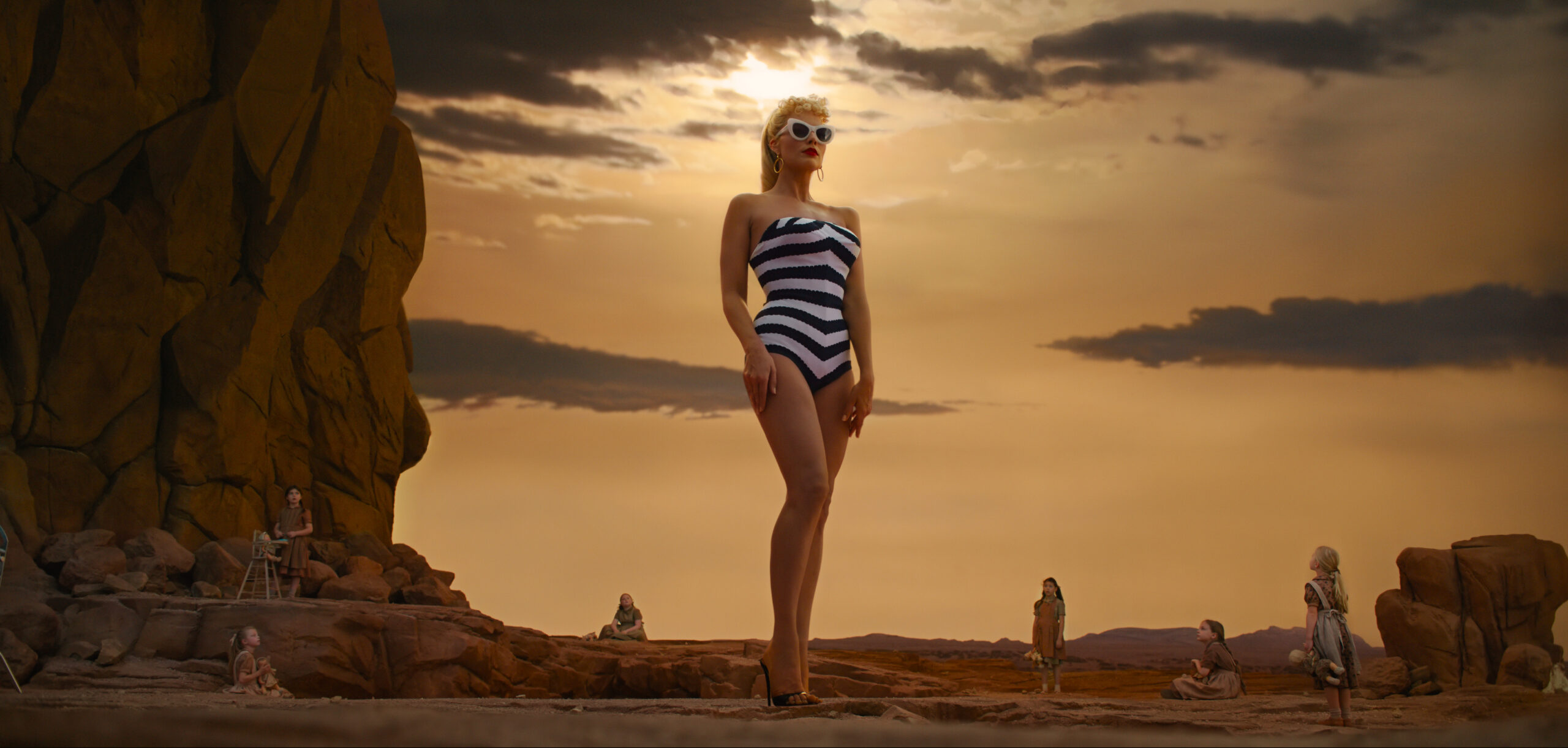
Poor Things is another contender in the Best Picture lineup about a woman navigating the toxic male patriarchy. The risqué comic fantasy from director Yorgos Lanthimos often comes across as Barbie’s evil twin. Emma Stone gives a devilishly fun performance as a Frankenstein-ish creation; her Bella Baxter is a comely woman with a baby-brain who learns to walk, talk and have sex pretty much all at once. The movie goes from twisted comedy to wildly anachronistic fairy tale, as Bella transforms from a vulnerable object of lust to an independent headstrong force confronting and confounding a violently misogynistic society with an equitable, forward looking, sex positive idealism. It’s as if Bella brought the future, and all its hashtag movements, down on the past.
Stone is in a head-to-head in the Best Actress category opposite Lily Gladstone, who would become the first Native American woman to win an acting Oscar should she come out on top for her role in Killers of the Flower Moon. She’s the beating heart in a movie about America’s corrupt soul, playing a woman from Osage Nation a century ago who witnessed her family being murdered for their oil money. The culprits included her husband Ernest (Leonardo DiCaprio), his uncle William Hale (Robert De Niro) and a government that largely ignored the murders of Indigenous people. You’ll notice that law enforcement only enter the picture after a white man dies.
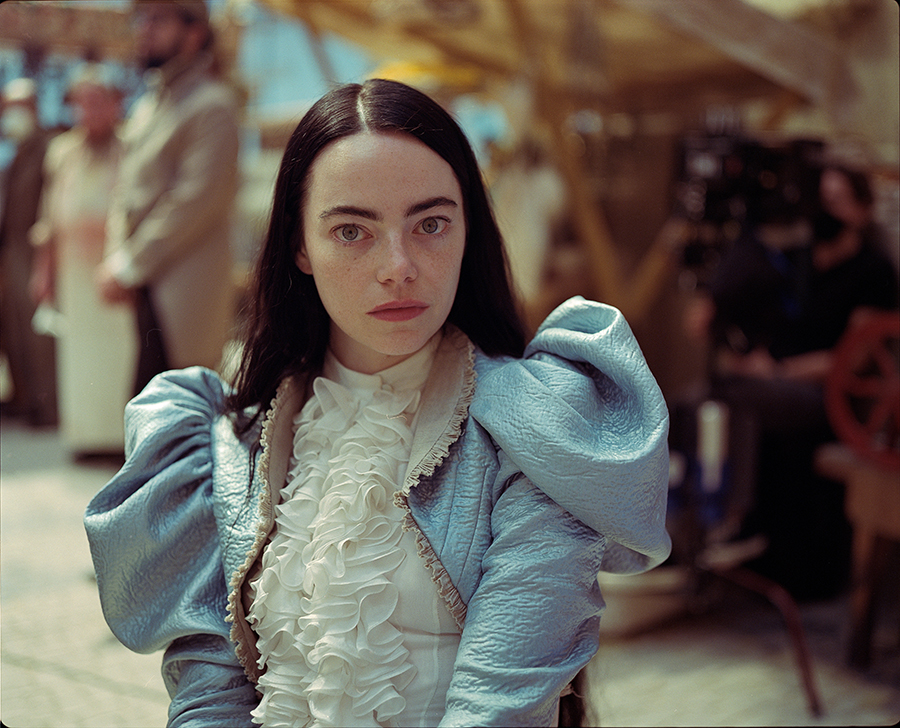
When we interviewed Gladstone after Killers of the Flower Moon premiered in Cannes, she directly connected that apathy, and a criminal justice system that doesn’t protect Indigenous communities, to what is happening with Missing and Murdered Indigenous Women today. “Everything you see in this film did happen 100 years ago and is very specific to the ‘reign of terror’ in this history,” said Gladstone. “But in ways, it is all still happening. It’s still that lawlessness. We’re still restricted in our sovereignty.”
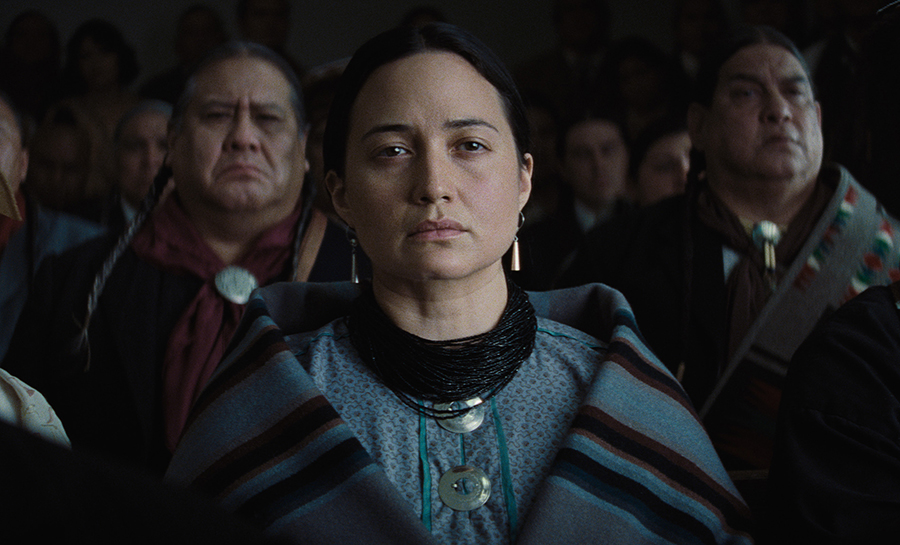
The best films of the year in my mind are Killers of the Flower Moon and The Zone of Interest, both of which are about genocide told from the perpetrators’ perspectives. The latter film is about the Nazi family who run Auschwitz, hosting garden parties or going about their rituals and duties, completely desensitized to the cries of horror that can be heard from a distance over the fence. In general terms, the movie is about how we, even today, can go about our daily lives by ignoring the horrors we may, even peripherally, as a society, have a hand in.
Oppenheimer, the film mostly likely to win Best Picture at the Oscars, rounds out the trio of contenders that are about genocide or, specifically, about how people compartmentalize themselves in order to commit such atrocities. Christopher Nolan’s prestige blockbuster, which is about J. Robert Oppenheimer’s leadership during the construction of the atom bomb, visualizes that compartmentalization in a way that is echoed in The Zone of Interest. Both films have characters mulling over blueprints – designs of the atom bomb and Aushwitz’s gas chambers – that reveal the engineering and inner workings, the various compartments that operate in isolation but in unison. It’s as if these characters are looking at the blueprints of their own souls as they coldly fuss over effectiveness and efficiency, speaking about end results as simple calculations in a science project while avoiding mentioning that it is mass murder that they’re dealing with.
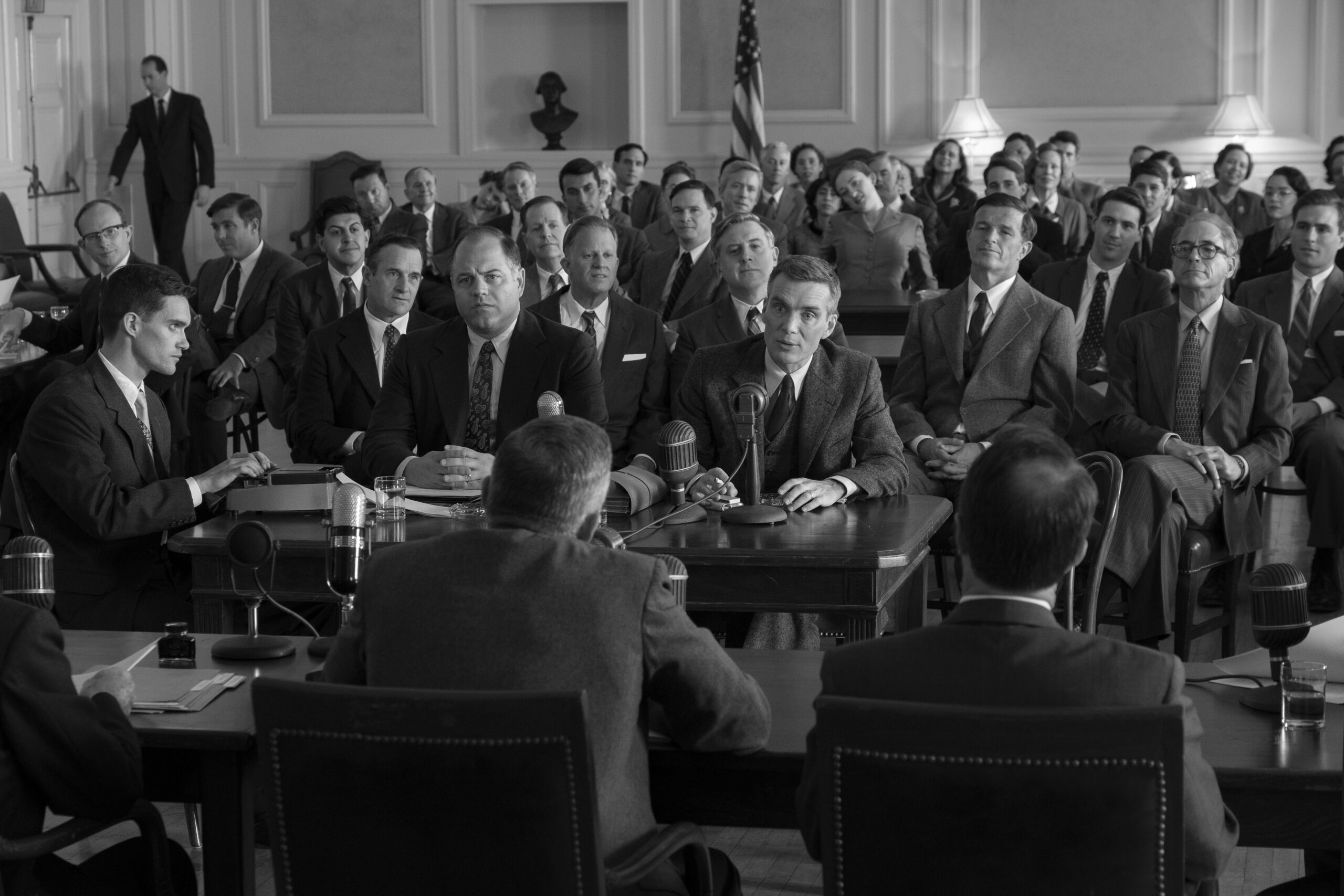
The way a film like The Zone of Interest speaks to the present made itself spectacularly clear during awards season, and threatens to do so at the Oscars. The Golden Globes, Critics Choice awards and SAG awards came and went without a thought spared for the rising casualty count during the Israel-Hamas conflict – a glaring contrast to the past year when the war in Ukraine occupied so much awards season airtime.
The scene at the Independent Spirit Awards even played out like The Zone Of Interest. Protestors, including filmmaker Merawi Gerima, used loud speakers to continuously call for a ceasefire just outside the venue. Inside the venue, the actors and filmmakers stepped up to the podium, gave their acceptance speeches, made their quips and tried desperately to ignore the cries from outside in the same way that the characters in The Zone of Interest go about their routines in their garden despite the soundscape from the other side of the wall.
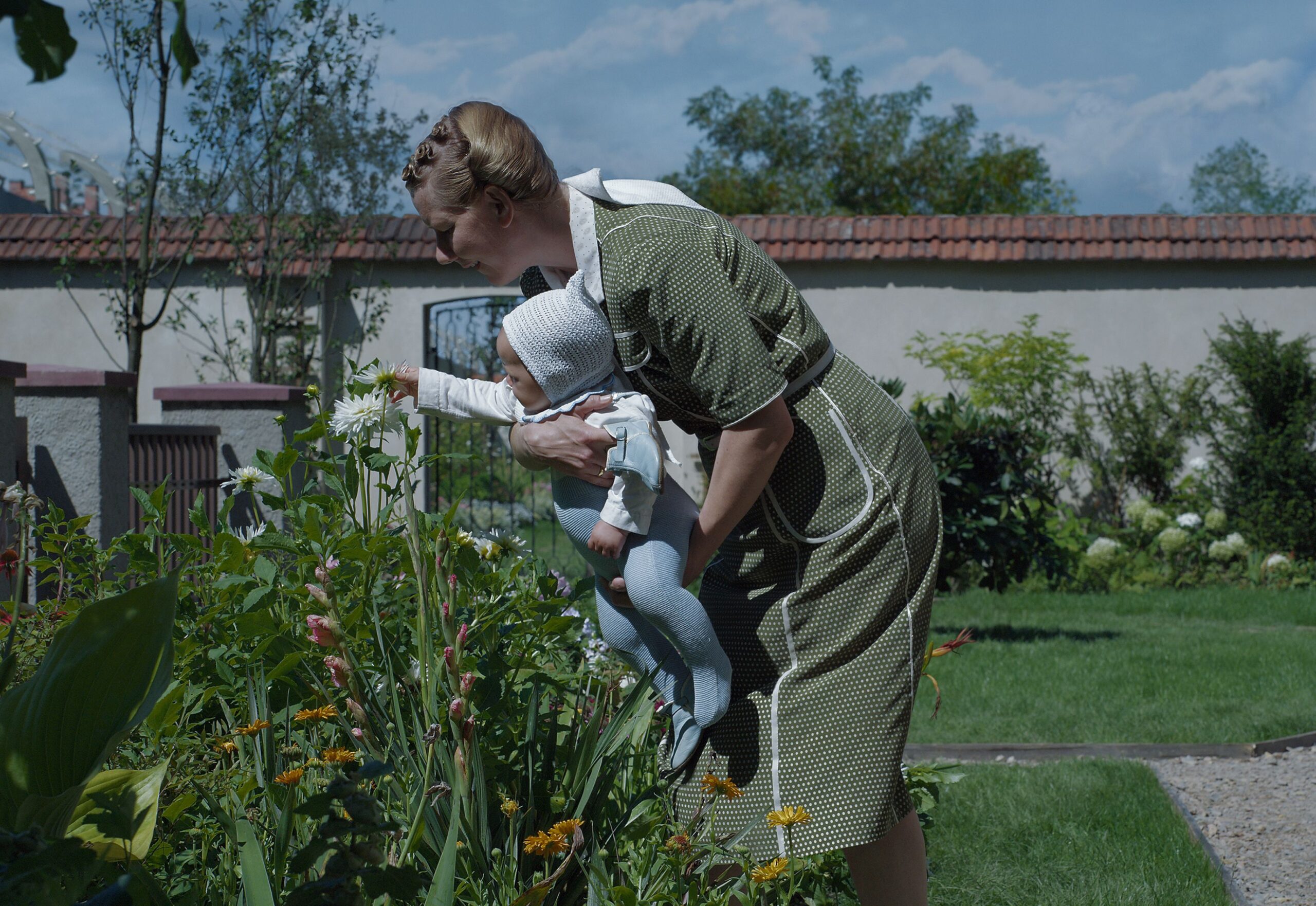
“We may close our eyes and ears to the suffering of groups of people over our wall,” said the film’s producer Jim Wilson in a video acceptance speech at the Toronto Film Critics Awards Gala earlier this week, where his won Best Picture. He bucked the trend, and took his moment to speak eloquently for the “tens of thousands of innocent people in Gaza” who have been killed as a disproportionate response to the “terrorist mass killing of innocent people in south Israel on October the 7th.”
“I know politics in award speeches can grate,” Wilson continued, “but I think speaking about the normalization of systematic violence, the dehumanization, even if partial, of groups of people, so it’s easier to care a bit less about them being killed or hurt or exploited or dispossessed, is organic to this film.”
Wilson’s speech stood apart from the glaring cognitive dissonance we have witnessed so far in Hollywood while making it clear that, though his film is about the past, like so many others this year it is firmly in conversation with the present.
The question is will that conversation, even after collecting a few Oscars, continue to fall on deaf ears.
RELATED: